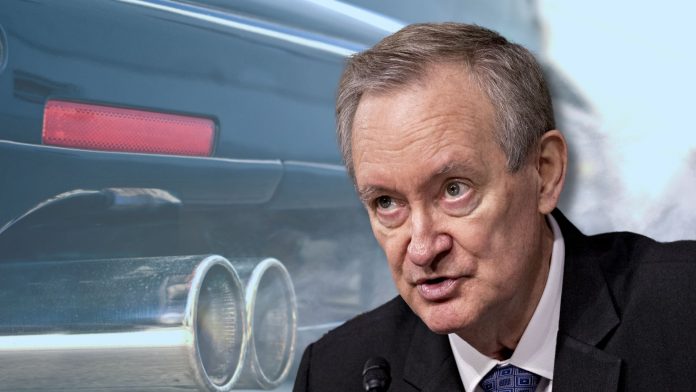Twenty-five Republican Senators and Democratic Sen. Joe Manchin are backing a bill that would nullify the Environmental Protection Agency’s (EPA) recently pitched emissions standards.
Announced earlier this year, the EPA regulations would impose the strictest climate-change policies in U.S. history. The proposal’s effective date is roughly four years away, after which the permissible volume of emitted gas would shrink on a yearly basis. This plan would effectively force automakers to either offset emissions through sales of alternative fuel, hybrid and electric vehicles or incur heavy penalties.
The internal combustion engine would not be banned under the rule, as some have claimed, but the EPA does expect the policy to boost EV demand until sales of gas-powered cars account for a minority of the total market. Since unveiling the new emissions standards in April, the EPA, the National Highway Traffic Safety Administration and the Biden Administration have faced stiff resistance from Republican lawmakers and manufacturers.
“Americans deserve to have access to affordable, reliable vehicles fueled by American-made energy products,” said Republican Senator and member of the Senate Finance Committee Mike Crapo, speaking to Fox News. “However, the Biden EPA’s rule change would hurt everyday Americans while simultaneously helping China.”
Crapo’s concerns echo statements made earlier this week by the Alliance for Automotive Innovation, a lobby group representing a majority of automakers in the U.S. The organization estimated that the proposed emissions standards would increase average car prices by $3,000 between 2027 and 2032. In other remarks, the alliance has said the automotive industry could lose $14 billion in fines within the next decade if it was forced to comply with the new standards.
Resistance to the Biden Administration’s climate-change policies has predominantly come from the automotive industry and right-leaning members of Congress. However, some EV brands, notably Tesla, have not only voiced support for the new emissions standards but urged the EPA to implement even more aggressive policies.
Furthermore, although opponents to the bill frequently express concerns that manufacturing would flock to China rather than comply with the Biden Administration’s policies, companies have broken ground on multiple EV factory sites in the U.S. since the start of the year. This is largely due to a stipulation in the Inflation Reduction Act, which prohibits automakers from earning generous incentives if they fail to manufacture their electric vehicles on American soil with American-sourced materials. Should these incentives remain in place, there is little reason to assume that the industry will abandon its projects, which have already cost billions, to move their operations to another country. Regardless, it remains to be seen whether lawmakers will choose to adopt the EPA’s new emissions standards or side with the Biden Administration’s opponents.



